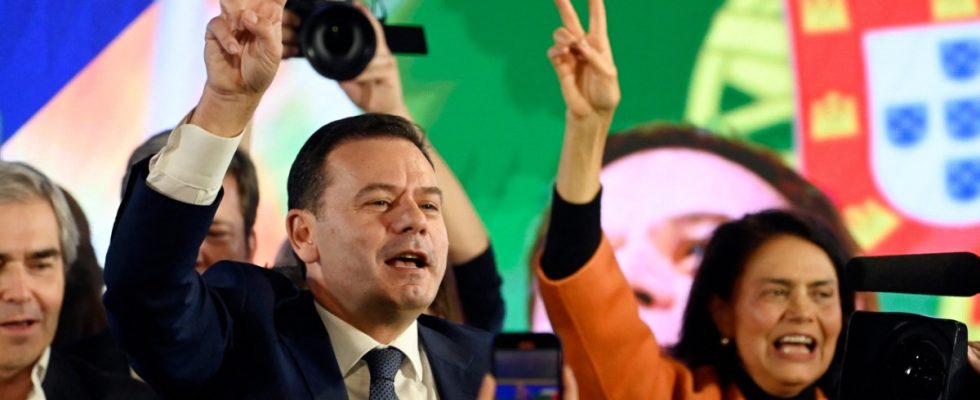Portugal is facing a change of political direction. After eight years under socialist government, right-wing parties accounted for more than half of the votes cast in Sunday’s parliamentary election. The conservative electoral alliance Aliança Democrática (AD) emerged from the vote as the strongest force. After more than 99 percent of the votes were counted, it and its offshoot in Madeira won around 29.5 percent. The Socialists (PS), who have been in power for eight years, became, although just behind, only the second strongest force and achieved 28.7 percent.
AD top candidate Luís Montenegro declared his party alliance the winner that night, his socialist rival Pedro Nuno Santos admitted his defeat and announced he would go into opposition. The right-wing populist party Chega (“Enough”) met the election researchers’ predictions and got more than 18 percent.
The center-right alliance can try to put together a minority government
In purely mathematical terms, the right-of-centre parties would have an absolute majority. But AD leader Montenegro had already ruled out cooperation with the southpaw Chega before the election and confirmed this on Monday night. If he sticks with it, Montenegro will have to try to put together a minority government despite possible support from the economically liberal party Iniciativa Liberal (IL, around five percent). Montenegro said in his victory speech that he would strive for “dialogue and consultation between parties.”
However, AD boss Montenegro could come under pressure because parts of his party are in favor of joining forces with Chega. The Socialists’ leading candidate, Pedro Nuno Santos, admitted his defeat on election night. He said he would not support a moderate conservative minority government.
Is the firewall now breaking to the right? Chega’s top candidate André Ventura declared before all the votes were counted that he was ready for a coalition with the AD and appealed to the responsibility of his political competitors. Portugal voted for an AD-Chega alliance, Ventura said.
There could be a power struggle in the PS
In the elections in January 2022, the socialist party PS, led by the previous Prime Minister António Costa, won an absolute majority of parliamentary seats. After the prime minister’s resignation last November, the Socialists were led into the early elections by his former infrastructure minister Nuno Santos and recorded significant losses in votes. Even together with other left-wing and communist parties, the left-wing bloc remains in the minority. Whether a power struggle will flare up within the PS will become clear in the coming days.
A good 10.8 million eligible voters at home and abroad were called on Sunday to re-elect the Portuguese parliament, which has 230 members. Even before the polling stations closed, it became apparent that voter turnout this time would be significantly higher than in the previous votes in 2019 and 2022. Almost two thirds of the population eligible to vote went to the polls on Sunday; turnout in the last elections was only close over 50 percent.
The performance of the right-wing populists from Chega, which was a one percent party just five years ago, was watched with excitement. Your boss, Ventura, was able to benefit from what pollsters said was widespread dissatisfaction. He presented himself as the only unaffected politician and scored points in an aggressive election campaign with populist theses on corruption, social policy and immigration.
The president must now decide whether to form a government
19 parties and party alliances took part in the vote. Some parties had formed so-called pre-election coalitions. One such party was the Aliança Democrática (AD), which consists of the People’s Party PSD and two smaller right-wing parties. Its leader, PSD MP Luís Montenegro, refrained from using sharp tones during the election campaign and tried to convince as broad a group of voters as possible of his goals.
In Portugal, however, parliament does not elect the head of government. This decision remains reserved for the President. This, Marcelo Rebelo de Sousa, will now speak to all parties by the end of this week and then probably instruct the candidate of the party with the most votes to form a government and present a government program. Parliament, in turn, would have the right to reject this proposal – which, however, has only happened once in the country’s democratic history.
The early election became necessary after a corruption scandal in November led to arrests and house searches in the highest government circles. The events prompted Prime Minister Costa, who has been in power since 2015, to resign immediately after the investigation became known, and President Rebelo de Sousa called new elections. To date, however, the judiciary has not personally charged Costa.
The 62-year-old was able to provide solid economic policy data during his term in office and was also respected abroad. Domestically, however, things were fermenting. In the past 18 months in particular, dissatisfaction in the public service as well as among teachers, police officers and medical staff has increased dramatically. Life is no longer affordable for many workers in Portugal, especially in the cities.

